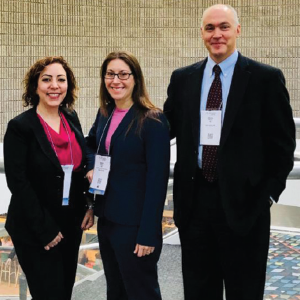Ever wonder what role physician regulators—rheumatologists, in particular—perform at the U.S. Food & Drug Administration (FDA)?
“I am not sure that many practicing rheumatologists know there are clinicians who work for the FDA,” says rheumatologist Nadia Habal, MD, a medical officer in the Division of Pulmonary, Allergy, and Rheumatology Products at the FDA. “It would be nice for them to know that we have an essential role here in many capacities.”
Reviewing New Drugs
Clinicians review and evaluate new and investigational drugs, as well as associated submissions, such as clinical study protocols and their amendments, safety reports and labeling supplements.
These physicians also provide regular updates and recommendations to clinical reviewer team leaders on an assigned portfolio of regulatory submissions, analyze and summarize clinical trial data submitted by industry or individual investigators during the review of regulatory submissions, conduct literature searches and compile data to prepare reports related to the work of the division, and develop background data pertinent for FDA programs, among other duties.
Impact on Patients
“As a physician, you see firsthand how medications impact patients,” Dr. Habal says, referring to the need to ensure necessary lab tests for screening and maintenance are performed, to recognize potential barriers to taking a drug, including dose, frequency, method of delivery and side effect profiles, and to assist with insurance approval for the expensive drugs used to treat rheumatologic conditions. With these insights, the role physicians play at the FDA can make a big difference in patients’ lives.
Nikolay P. Nikolov, MD, medical office team leader at the FDA, views his role as a regulator as similar to that of being a physician in practice. As a regulator, however, he says, “I assess the benefits and potential risks of new therapies to the population of patients rather than to an individual patient.”
A board-certified internist and rheumatologist, Dr. Nikolov is also associate director for rheumatology in the Division of Pulmonary, Allergy, and Rheumatology Products, Center for Drug Evaluation and Research (CDER), as well as the division’s transition lead for the soon-to-be-formed Division of Rheumatology and Transplant Medicine, as part of the ongoing Office of New Drugs’ (OND’s) reorganization.
After completing an internal medicine residency at Lincoln Medical Center, the Bronx, N.Y., in 2002, Dr. Nikolov joined the National Institute of Arthritis and Musculoskeletal and Skin Diseases (NIAMS), National Institutes of Health, where he completed his rheumatology fellowship in 2004, participated in clinical investigational protocols and studied cellular and molecular mechanisms of autoimmunity in animal models in the Immunoregulatory Group, Autoimmunity Branch at NIAMS.
“I first learned about the opportunity to work as a clinician at the FDA from a colleague, a one-year senior NIH co-fellow, who moved from NIH to the FDA as a medical officer,” he says. “Subsequently, several of my co-fellows also moved from the NIH to work for the FDA.” Dr. Nikolov joined the FDA himself in 2009 as a medical officer.
A Day in the Life of a Clinical Team Leader

From left: Dr. Habal, Dr. Glaser and
Dr. Nikolov.
Rachel Glaser, MD, says as clinical team leader in the Division of Pulmonary, Allergy, and Rheumatology Products, her daily work activities involve interesting and challenging scientific discussions with a multidisciplinary team including statisticians, clinical pharmacologists, pharmacologists/toxicologists and chemists, among others.
“We communicate directly with patients and other members of the community during patient-focused drug development meetings and FDA listening sessions,” she says, “which provides us an opportunity to hear directly from patients about the impact of their disease on their daily lives.”
Her team also interacts with physicians, researchers and industry at advisory committee meetings, workshops, conferences and other meetings, and meets with industry at regular intervals during the development of drugs and biologics. “And there are opportunities for more general discussion about drug development in particular disease areas, as well,” she says.
Dr. Glaser has regular meetings to discuss ongoing clinical development programs in rheumatology and reviews the efficacy and safety of drugs and biologics. She also assesses the risks and benefits of treatment for specific rheumatologic diseases and conditions and, ultimately, helps draw conclusions regarding whether these treatments should be approved for use in the U.S.
She says the biggest unmet need in rheumatology is to provide treatments to those with limited available options. “We have made enormous strides in the last several decades in the treatment of several rheumatologic diseases, such as rheumatoid arthritis and psoriatic arthritis; however, there are many diseases for which we have no approved therapies to offer patients,” Dr. Glaser says.
A board-certified internist and adult rheumatologist, Dr. Glaser first learned about the FDA as a potential career during fellowship where several of her attendings were FDA clinical reviewers. She ultimately joined the FDA about five years ago after working in clinical practice for several years.
Training & Background
While Dr. Glaser says the FDA’s clinical reviewers and clinical analysts have diverse training and backgrounds. She relies on her clinical training and experience as a physician in her work for the FDA every day. And she continues to see patients weekly.
“My clinical experiences complement my work at the FDA by providing the context of what is important to patients and providers, and also a better understanding of rheumatic diseases,” she says. “This helps me and the rest of the team assess the benefit risk for new therapies and new indications.” She adds that seeing patients regularly is also essential to keeping her clinical skills sharp.
Dr. Nikolov says a clinical background is critical to better understanding how to apply the benefit-risk assessment from a patient to the population.
“Having a subspecialty in rheumatology is another asset to better understand how to apply the regulatory framework in drug development for specific rheumatologic diseases,” he says.
A Day in the Life of an Associate Director
Dr. Nikolov’s duties involve overseeing the rheumatology team of 10 medical officers in his division, serving as a resource for staff, helping manage the OND’s structural transition and “launching efforts to modernize the FDA as a champion of change within the division and across OND,” he says.
For the past decade Dr. Nikolov has been involved in the regulatory review of immunomodulatory therapies, including small molecules, biologics and biosimilars for the treatment of pediatric and adult rheumatologic diseases at the FDA. He also participates in the development of the agency’s policies in these areas.
In addition to his other duties as lead for the division, Dr. Nikolov provides advice to the division director and other center leaders on questions related to rheumatologic diseases, maintains personal contacts with thought leaders inside and outside the agency through his regulatory and academic activities, and he represents the division and the agency as a rheumatology subject matter expert at a variety of working groups and meetings that include advisory committees, professional societies, patient-focused drug development groups and patient-advocacy groups.
“While we are very active in our external stakeholder engagement efforts, which include participation in professional society meetings, advocacy group meetings, research fora, workshops, advisory committee meetings,” Dr. Nikolov says, “we would need more human resources to be able to organize and attend more such meetings.”
Dr. Nikolov is also the lead in an interdisciplinary team of scientists evaluating new products for rheumatologic indications, ensuring their safety and effectiveness as well as establishing appropriate safeguards for testing experimental rheumatology products in humans, He also participates in the review of product labeling and advertising, post-market surveillance, improvement of research and evaluation practices, and the development of regulations regarding rheumatology product development and marketing.
“The FDA is a dynamic, purpose-driven organization dedicated to the review of new drug applications, interactions with all stakeholders, and ultimately deciding whether the benefits of a drug outweigh the known risks,” he says. Dr. Nikolov views the need for better outcome measures particularly in the rare rheumatologic diseases as one of the impediments of drug development. But in more prevalent rheumatic diseases, such as rheumatoid arthritis and psoriatic arthritis, he says the success in drug development has resulted in changing the treatment paradigm from symptomatic management to potentially inducing long-term disease control and remission, which presents new opportunities for drug development.
Biosimilars
As division lead for biosimilars, Dr. Nikolov is also very active in the development of these drugs, providing advice and overseeing the review of biosimilar development programs, leading collaborative reviews of cross-division biosimilar applications, developing policy on biosimilars and interchangeables through intercenter and cross-division collaborations and leading the agency’s outreach efforts on education of rheumatology stakeholders about biosimilars and interchangeables.
“We get to see the cutting-edge science and drug development not available to anyone else, which makes this job so unique and exciting,” he says.
Challenging & Confidential
Most agree the job of a physician at the FDA is extremely interesting, highly intellectually challenging, rewarding and impactful. “We take pride in our work, which is very interactive, collaborative and professional,” says Dr. Nikolov. “We are all driven by the FDA mission of protecting the public health by ensuring the safety, efficacy, and security of human and veterinary drugs, biological products, and medical devices; and by ensuring the safety of our nation’s food supply, cosmetics and products that emit radiation.”
And just like in clinical practice and other industries, Drs. Glaser and Nikolov agree that confidentiality is critical when it comes to working with the FDA, and that the department’s position is one of public trust that must be protected.
“I think people are generally very respectful and do not ask many questions about confidential information,” Dr. Glaser says. When asked about the most interesting thing she has learned doing this work, she adds, “It’s probably confidential.”
Renée Bacher is a frequent contributor to ENT Today and the AARP Bulletin. Her article about heart disease in women, “This Story Could Save Your Life,” won a National Health Information Award for Family Circle magazine.



